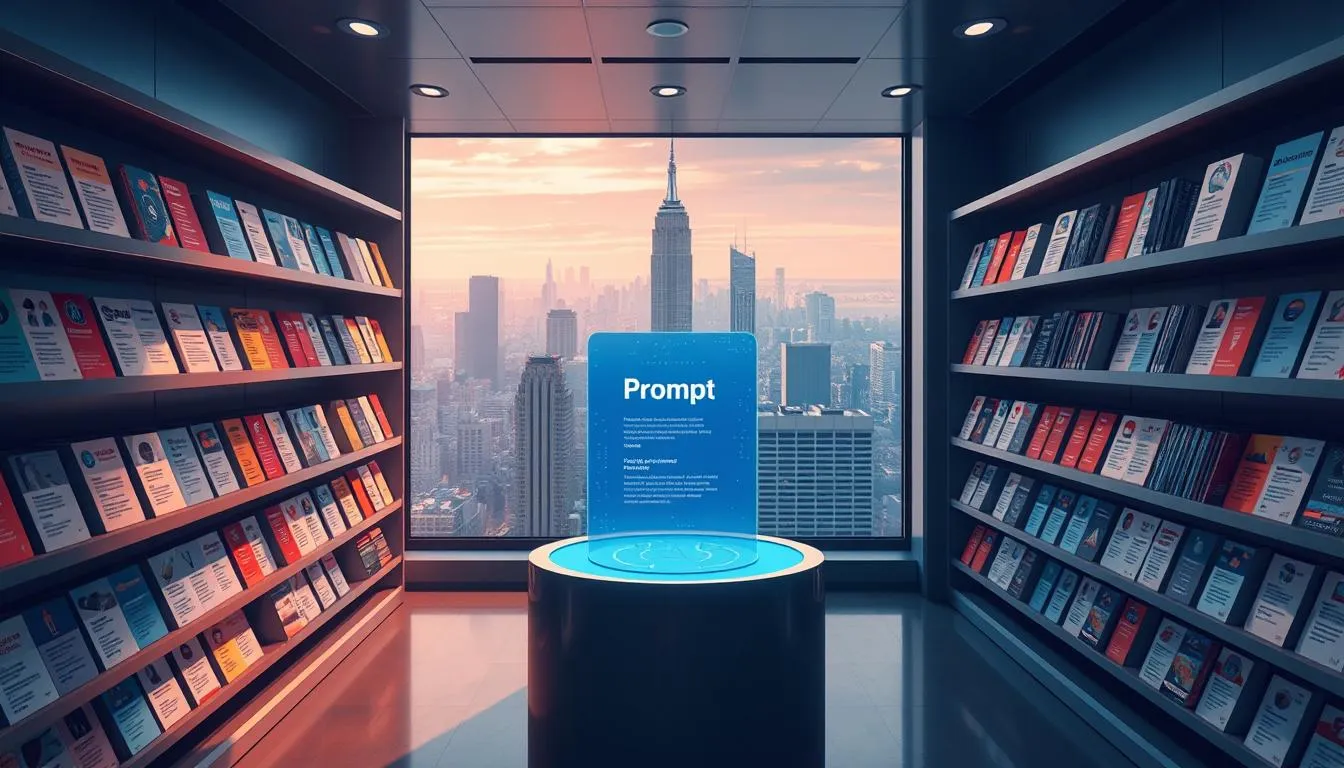Did you know top-performing marketing teams use curated collections with over 30,000 pre-built prompts to generate content 3x faster than manual methods? These game-changing resources are reshaping how businesses approach creativity, turning hours of brainstorming into minutes of precision.
Imagine having instant access to proven frameworks for social media posts, blog outlines, or sales emails. Curated prompts act like a professional toolkit, giving clear directions to tools like ChatGPT or Claude. No more staring at blank screens or wasting time on trial-and-error approaches.
Modern creators now achieve what used to take days in mere hours. A recent study showed businesses using these systems reduced content planning time by 68% while improving engagement metrics. The secret? Expert-designed starters that align with platform algorithms and audience preferences.
Key Takeaways
- Pre-built templates eliminate guesswork for faster results
- Massive collections cover every business need from SEO to sales
- Proven frameworks boost content quality and consistency
- Easy integration with popular generative platforms
- Scalable solutions for teams of all sizes
Whether you’re crafting viral tweets or detailed whitepapers, these organized systems provide the springboard you need. Let’s explore how to harness their power for your creative workflow.
Discovering the World of AI Prompts
The secret to rapid content creation lies in smart resource utilization. Instead of reinventing the wheel with every project, professionals now rely on organized systems that deliver consistent quality. These systems act as launchpads, transforming vague ideas into structured outputs within minutes.
What Is a Modern Content Accelerator?
A curated collection of ready-to-use instructions serves as your digital Swiss Army knife. Imagine having thousands of tested formulas for social posts, email campaigns, or blog drafts at your fingertips. These pre-built frameworks eliminate the guesswork, letting you focus on refining ideas rather than starting from scratch.
 Gone are the days of typing random queries into chatbots. Today’s solutions evolved from trial-and-error experiments to precision instruments. Marketing teams report 53% faster project completion when using these resources, according to recent industry surveys.
Gone are the days of typing random queries into chatbots. Today’s solutions evolved from trial-and-error experiments to precision instruments. Marketing teams report 53% faster project completion when using these resources, according to recent industry surveys.
Strategic Communication Building Blocks
Effective content strategy now hinges on using purpose-built starters. Generic requests like “write a blog post” yield mediocre results compared to specialized templates. Professionally designed frameworks account for platform algorithms, audience psychology, and conversion goals.
These systems work across popular platforms like ChatGPT and Gemini, ensuring flexibility. A travel agency might use tailored starters for itinerary suggestions, while an e-commerce brand employs product description templates. The result? Relevant outputs that resonate with specific audiences, created in record time.
Key Features and Benefits for Content Creators
Content teams are discovering how structured frameworks transform their daily workflows. These solutions cut through creative friction while maintaining brand integrity across all channels.

Enhancing Productivity with Pre-Written Formulas
Professionals save 4-6 hours weekly by using battle-tested templates. AI Video Scriptwriting: The Future of Video Content Creation media manager recently shared: “Our team produces 35% more posts since adopting these frameworks – without quality compromises.”
Pre-built formulas act like GPS for creativity. They guide tools to generate targeted outputs – from email sequences to product descriptions – in 3 clicks. This eliminates endless revisions and keeps projects moving forward.
Streamlining the Writing Process
Standardized templates ensure every piece aligns with brand guidelines. Marketing directors love how organized systems maintain voice consistency across writers and campaigns.
Three key advantages emerge:
- 70% faster drafting for blog outlines and video scripts
- Automatic alignment with SEO best practices
- Scalable solutions that grow with team needs
One tech startup reduced content planning meetings from weekly to monthly using these systems. Their team now focuses on strategic storytelling rather than formatting basics.
Optimizing Your Workflow with AI Tools
Modern teams achieve peak efficiency by aligning their creative processes with intelligent systems. When strategic frameworks meet adaptable platforms, businesses unlock new levels of productivity while maintaining brand consistency.

Seamless Platform Integration
Connecting curated frameworks to popular platforms takes minutes. Most solutions offer direct copy-paste functionality for ChatGPT and Claude. Marketing specialist Jenna Carter notes: “We reduced setup time by 80% using drag-and-drop templates that work across multiple tools.”
Tailoring Frameworks to Your Field
Generic templates become powerful assets through customization. Healthcare companies add compliance checkpoints to content starters, while e-commerce brands inject product-specific details. Follow this three-step approach:
- Identify core objectives for each project type
- Modify placeholder text with industry terminology
- Test variations against key performance metrics
Evolution Through Updates
Top-tier platforms refresh their collections monthly, incorporating user feedback and trend analysis. Subscription models (starting at $3.99/month) ensure access to the latest features. One financial services team saw 42% better engagement after adopting updated email campaign templates.
Exploring Diverse Categories and Resources
Modern professionals need solutions that flex across departments while maintaining specialized expertise. Today’s leading platforms offer 420+ business strategy prompts alongside 320+ SEO frameworks – all in one organized hub. This variety lets teams tackle operational planning and keyword research without switching tools.
Cross-Functional Tools for Administration, SEO, and More
Marketing squads blend campaign templates with productivity boosters. A social media team might combine 354 marketing prompts with 386 efficiency formulas to schedule a month’s content in hours. Education sectors use specialized categories like lesson planning and student assessments to streamline administrative tasks.
Key applications include:
- HR teams creating onboarding materials using 370+ solopreneur resources
- E-commerce brands merging product description templates with SEO metadata guides Check out our guide on comprehensive Plan and Schedule guide.
- Schools adapting communication frameworks for parent newsletters
“We reduced cross-department meetings by 40% using shared templates,” shares a tech startup’s operations director. “Sales and marketing now align campaigns faster using the same core frameworks.”
Selecting the right categories starts with three steps:
- Audit current workflow bottlenecks
- Match needs to specialized collections (writing, analytics, etc.)
- Test top 3-5 templates weekly
With libraries updating quarterly, teams gain fresh approaches for emerging challenges. The best systems grow with your needs – whether scaling content production or refining niche strategies.
Leveraging the AI Prompt Library for Business Growth
Businesses using structured content systems report 45% faster revenue growth compared to manual methods. These frameworks help teams convert ideas into measurable results while maintaining brand consistency across channels.
Fueling Marketing Success
Marketing teams achieve 3x more organic traffic by combining SEO-optimized templates with data-driven adjustments. A fitness brand increased website visitors by 78% using keyword-rich blog starters from the curated content frameworks.
| Plan | Features | Best For |
|---|---|---|
| Mega-Prompt Bundle ($9.99/mo) | 1,200+ text templates | Startups needing blog/social content |
| Complete Bundle ($15/mo) | 3,400+ cross-channel tools | Scaling teams requiring video/email solutions |
| Enterprise Custom | Dedicated support + analytics | Companies with 50+ users |
Strengthening Connections & Operations
Personalized email sequences built with these systems show 62% higher open rates. Customer service teams resolve tickets 40% faster using pre-approved response templates that adapt to common scenarios.
E-commerce stores using standardized frameworks:
- Cut product description creation time by 6 hours weekly Check out our guide on expert Discover the Power strategies.
- Improved review response consistency by 89%
- Reduced customer onboarding costs by $3,200/month
With 7-day guarantees and tiered pricing, businesses test risk-free before committing. The right system grows with your team – whether handling 50 monthly campaigns or 5,000.
Conclusion
Unlocking your team’s creative potential begins with the right toolkit. Structured frameworks transform how teams approach content creation, turning complex tasks into streamlined processes. Businesses report 68% faster project completion while maintaining brand consistency across channels.
New users often ask: How do I start? Focus on solutions offering adaptable templates and reliable support. Trial periods let teams test systems risk-free before full adoption. Always verify outputs for accuracy and protect sensitive data during implementation.
Successful teams choose resources that evolve with their needs. Look for platforms updating templates quarterly and providing dedicated help centers. These features ensure long-term value as your content strategy grows.
Ready to revolutionize your workflow? Begin with free trials or entry-level plans. Support teams stand ready to answer questions and guide your first steps. The future of efficient creation lies in smart systems – will your team lead the charge?
FAQ
How does a prompt collection improve content creation?
A curated prompt collection provides ready-to-use templates that spark ideas, reduce writer’s block, and help maintain consistency. Platforms like Jasper and Copy.ai use these templates to guide outputs, saving time while aligning with brand voice or SEO goals.
Can these tools adapt to niche industries?
Yes! Many platforms allow customization for specific fields like healthcare, e-commerce, or tech. For example, HubSpot’s Campaign Assistant tailors marketing prompts, while Frase.io optimizes SEO content for specialized topics.
What makes pre-written templates efficient for teams?
Pre-written templates standardize workflows, ensuring everyone follows best practices. Tools like Notion or Trello integrate them directly into project boards, cutting revision rounds and speeding up approval processes.
How often are new templates added to libraries?
Top services like Simplified or Writesonic refresh their libraries monthly. Updates reflect trending topics, algorithm changes, and user feedback to keep content relevant and competitive.
Do these resources work with popular platforms like ChatGPT?
Absolutely. Many libraries export prompts seamlessly into ChatGPT, Claude, or Microsoft Copilot. Zapier integrations can even automate prompt insertion into tools like Google Docs or Canva.
Can small businesses benefit from prompt libraries?
Definitely. Startups use tools like CopySmith to generate ads, emails, and product descriptions quickly. This lets small teams focus on strategy instead of drafting from scratch.
Are there templates for customer support or analytics?
Yes! Libraries like PromptBase include categories for Zendesk ticket responses, Looker Studio dashboards, and Salesforce reports. This cross-functionality helps unify messaging across departments.
